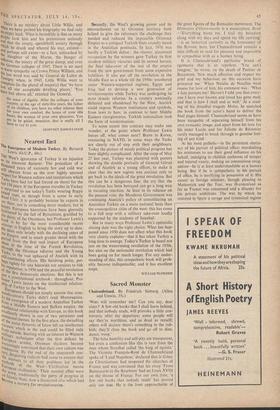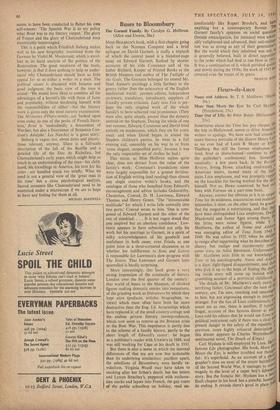Sacred Monster
`WHO will remember me? Can you say, dear sister? A few old books that I shall leave behind, and that nobody reads, will provoke a little con- troversy after my departure; some people will say they're worthless, and as dead as myself; others will declare there's something in the rub- bish; they'll close the book and go off to dine, dance, weep.'
The false humility and self-pity are transparent, but .even a confession like this is rare from the man whom Stcndhal called `the king of egoists.' The Vicomte Francois-Rend de Chateaubriand spoke of 'I and Napoleon,' declared that le Genie du Chri.stianiAme had reopened the churches of France and was convinced that his essay 'From Buonaparte to the Bourbons' had set Louis XVIII on the throne of France, For our own time, 'a few old books that nobody reads' has proved only too true. He is the least approachable of the great figures of the Romantic movement. The Me'moire$ d'Outre-tombe is a masterpiece, Rene —'Everything bores me, I trail my boredom along with my days and spend my life yawning' —is an historical curiosity as the forerunner of the Byronic hero, but Chateaubriand remains a man difficult to read for pleasure and impossible to sympathise with as a human being.
It is Chateaubriand's particular brand of egomania that is so repellent. 'You can't imagine,' he wrote, on the death of lauline de Beaumont, 'how much affection and respect my grief and my behaviour on this occasion have procured me.' When Natalie de Noailles went insane for love of him, his comment was: `What a fate pursues me! Haven't I told you that every- one I have ever known and loved has gone mad, and that is how I shall end as well.' At a read- ing of his dreadful tragedy Wise, he snatched the book from the actor's hand to deliver the final pages himself. Chateaubriand seems to have been incapable of separating himself from his own romantic image, and apart from his love for his sister Lucile and for Juliette de Recamier rarely managed to break through to genuine feel- ing of any kind.
At his most pathetic—in the persistent obstin- acy of his pursuit of political office; marshalling his mistresses to use their good influence on his behalf, indulging in childish outbursts of temper and injured vanity, making an ostentatious resig- nation—he is at least understandable as a human being. But if he is sympathetic in his pursuit of office, he is terrifying in possession of it. His career as foreign minister, though pleasing to Metternich and the Tsar, was ill-conceived as far as France was concerned and a disaster for his private ambitions. The war by which he restored to Spain a savage and tyrannical regime
seems to have been conducted to flatter his own self-esteem: 'The Spanish War is to my policy what Rene was to my literary output.' The glory of France and the glory of Chateaubriand were inextricably intermingled.
This is a point which Friedrich Sieburg makes well in his new biography, translated from the German by Violet M. Macdonald, which is excel- lent in its lucid analysis of the politics of the Restoration. The great weakness of the book, however, is that it does nothing to help us under- stand why Chateaubriand should have so little appeal for us as either a writer or a man. The political career is discussed with balance and good judgment, the basic view of the man is sound--`He would have liked to combine all the advantages of a hermit's life with those of fame and popularity, without burdening himself with the responsibilities of either'—but the literary work is given only the most cursory examination. The Memoires d'Outre-tombe, are 'looked upon even today as one of the peaks of French litera- ture,' Rend is `undoubtedly a descendant of Werther, but also a forerunner of Benjamin Con- stant's Adolphe.' Les Natchez is `a great story.'
Sieburg is vague, too, about dates and places: those relevant, anyway. There is a full-scale description of the fall of the Bastille and a detailed life of the Duc de Richelieu, but Chateaubriand's early years which might help so much in an understanding a the man—his child- hood, his travellings in America, his love for his sister—are handled much too briefly. What we need is not a general view of the `great man in his time' but a close psychological analysis. Sacred monsters like Chateaubriand need to be examined under a microscope if we are to hope to have any feeling for them at all.
MICHAEL BAKEWELL



































 Previous page
Previous page